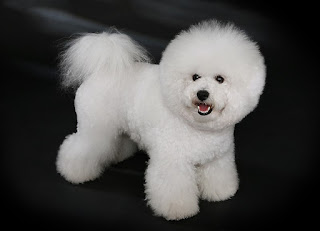A Bichon Frise is a small
breed of dog of the Bichon type. The Bichon Frise is a member of the
Non-Sporting Group of dog breeds in the United States, and a member of the Toy
Dog Group in the United Kingdom.
Etymology
The
Bichon Frise descended from the Barbet or Water Spaniel and the Standard
Poodle. The word bichon comes from Middle French bichon ("small
long-haired dog"), a diminutive of Old French biche ("bitch, female
dog"), from Old English bicce ("bitch, female dog"), related to
Old Norse bikkja ("female dog") and German Betze ("female
dog"). Some speculate the origin of bichon to be the result of the
apheresis, or shortening, of the word barbichon ("small poodle"), a
derivative of barbiche ("shaggy dog"); however, this is unlikely, if
not impossible, since the word bichon (attested 1588) is older than barbichon
(attested 1694). While "Bichon Frise" is derived from the French
"Bichon à poil frisé" meaning "curly lap dog," the
preferred English spelling does not include accents and is written simply,
"Bichon frise."
Description
Appearance
The
Bichon Frise is a small dog that weighs approximately 5–10 kg (10–20 lbs) and
stands 23–30 cm (9–12 in) at the withers, but slightly larger dogs are not
uncommon. The skull is slightly rounded and the muzzle is not pointy. The tail
is groomed to be long and curly and is carried over the back. It has a black
nose and dark round eyes; its white hair consists of a curly, dense coat with
little shedding , although many of the breed do tend to have less curly hair
than others. A small amount of buff, cream, or apricot color may be seen around
its ears, snout, paws or body, but normally these colors do not exceed 10% of
its body. FCI/AKC Standard coat color is pure white; other colors such as
apricot or grey are not recognized. A white coat is preferred in the show ring.
The head and legs are proportionate in size to the body, and the ears and tail are
natural . The coat is trimmed often to make the hair seem like an even length.
Bichon Frises can have a medium-high intelligence.
Temperament
The
American Kennel Club (AKC) refers to the Bichon Frise as "merry" and
"cheerful", and the breed standard calls for a dog that is
"gentle mannered, sensitive, playful and affectionate." The Bichon
Frise loves human company and demands much of your attention. They are
generally very sociable and do well with an owner that takes them along on
outings. They are charming, affectionate, and intelligent. Bichons do well with
children because they are playful and have lots of energy. If affiliated with a
particular territory and encouraged by owners, they can become very territorial.
Bred to be companion dogs, the Bichon Frise tends to get along well with both
children and other animals. Bichon Frises are very obedient if training is
started early and continued constantly.
Care
Bichon
Frises require a huge amount of time for grooming. The coat needs much
grooming. The hair must be combed from the coat to remove mats and tangles.
While it is recommended to have your Bichon Frise professionally groomed
monthly, as an owner, it is imperative to comb their coat twice a week.
As
Bichon Frises are white dogs, frequent bathing is required to maintain the
color. The coat must be combed thoroughly in order to prevent tangles. They are
prone to having ear infections, so keeping their ears clean will prevent that.
Training
Bichon
frises are easily trained. Training must be done with a gentle, but firm hand.
However, you should not scold or harsh corrections. They respond well to being
trained with being provided treats after accomplishing a lesson.
Bichon
Frises are very sociable, but if they are not properly trained, they can become
too active. The Bichon Frise Club of America recommends against purchasing this
dog from a pet shop and to instead adopt from a pound.
Health






No comments:
Post a Comment